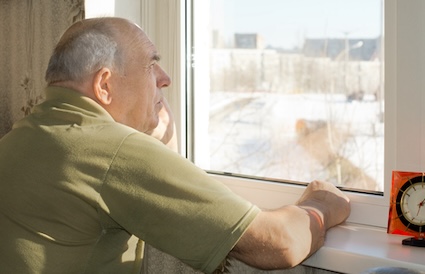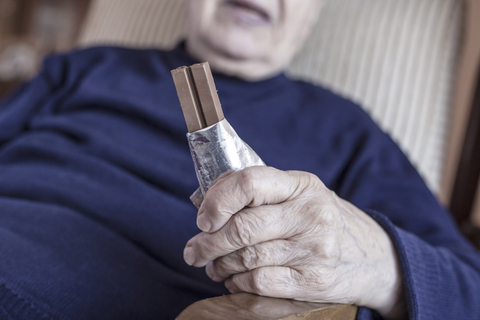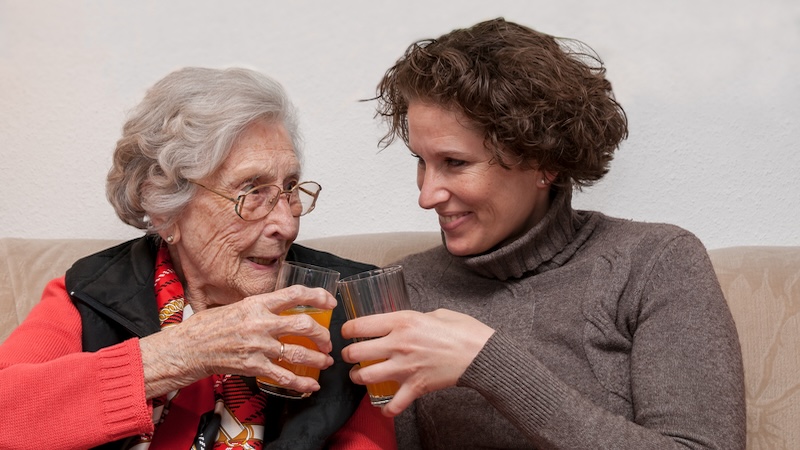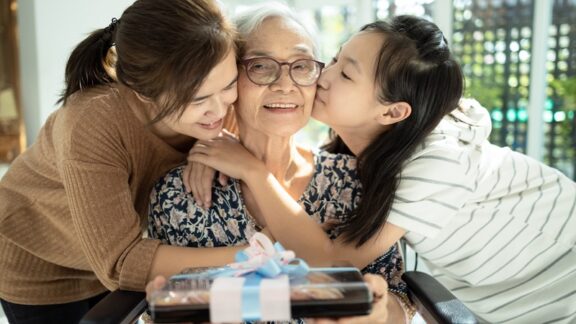A very simple action can make a big difference. Checking in on seniors, especially those aging in place, can support their mental and physical health, prevent crises, and more.
When Gene Hackman, his wife, and their dog were found dead in their home, it struck a chord with all of us. We realized just how easily something like this could happen to the people we care about and the importance of regular contact to avert these tragedies.
However, staying in touch isn’t just about ensuring your loved ones haven’t had some sort of life-threatening medical emergency. Regular visits, phone calls, and even texts can also go a long way in preventing chronic yet serious problems like isolation, loneliness, depression, and physical and cognitive decline, especially for people aging in place.
According to Leslie Tripp Holland, Sr. Director of Marketing & Communications of Alzheimer’s Association, Georgia Chapter, “A lot of times, when someone is diagnosed and on their dementia journey, friends may fall away, for many reasons. But if you can take 15 minutes and check in on them, they feel cared about.”
In partnership with Family Hospice, serving Georgia and South Carolina, the Alzheimer’s Association, Georgia Chapter, has launched #ICheckedIn, a social media campaign that encourages people to regularly check in on their loved ones and their caregivers.
“It [#ICheckedIn] promotes community involvement by reminding everyone that small, consistent acts of kindness, like a simple check-in, can improve mental health, strengthen social ties, and even prevent crises that often go unnoticed when someone is isolated,” explains Paige Powell, MSW, Experience Manager with Family Hospice.
While automated check-in services and home technology can help in monitoring someone living alone, they can’t replace the warmth of familiarity.
Why checking in on seniors matters
Here’s how just a few minutes out of your day can benefit the older adults in your life:
Increases social connection
 Maybe your friend or family member can’t drive anymore, or they have limited mobility that makes getting out of the house and meeting friends for dinner or other social activities difficult. According to the National Institute on Aging, lack of social interaction and the resulting loneliness can increase a person’s risk of high blood pressure, heart disease, obesity, and depression.
Maybe your friend or family member can’t drive anymore, or they have limited mobility that makes getting out of the house and meeting friends for dinner or other social activities difficult. According to the National Institute on Aging, lack of social interaction and the resulting loneliness can increase a person’s risk of high blood pressure, heart disease, obesity, and depression.
Taking dinner to them or stopping by to watch TV show together or just chat for a few minutes and see how they’re doing can keep them from becoming isolated. This interaction helps them “maintain emotional connection and a sense of belonging,” says Powell.
Not to mention, it can simply brighten their day!
Boosts cognitive health
In a study in the UK, people over 65 were asked to indicate whether they were lonely or not. This group, composed of both lonely and socially engaged seniors, was followed for more than 12 years. According to Professor James Goodwin, an expert in the physiology of aging, those who considered themselves to be habitually lonely at the end of that period experienced a 20% faster cognitive decline than their peers who had companionship.
Take 89-year-old Virginia, for example. She lived alone for years; however, when she had to stop driving about a year ago, the gregarious senior had little interaction with others. Soon family members began to witness a dramatic decline in her memory. She’s now living with her daughter, who takes her out to restaurants, the grocery store, the salon for mani/pedis, and other places where Virginia can chat up anyone who comes her way – and keep her brain active!
Catches problems early
When you pay a senior a visit, you might notice that their home is dirty (when it’s usually spotless), they’ve forgotten to take their medications, or they’ve left the oven on. Or perhaps it’s taking them a lot longer to answer the phone when you call or they’re sometimes not picking up at all.
A regular check-in “can alert others to changes in behavior, mood, or environment [as well as physical changes] that may signal a need for additional help,” explains Powell. That way you’ll be able to intervene before a decline reaches a dangerous stage.
Promotes healthy habits
 It’s common for seniors who live alone to make a meal out of a bag of chips or not get off the couch for hours. If you can pop in now and then, you can take them a healthy lunch or dinner or encourage them to walk with you to the mailbox or neighbor’s house down the street while you tell them about your recent vacation.
It’s common for seniors who live alone to make a meal out of a bag of chips or not get off the couch for hours. If you can pop in now and then, you can take them a healthy lunch or dinner or encourage them to walk with you to the mailbox or neighbor’s house down the street while you tell them about your recent vacation.
In 87-year-old Ted’s case, he’s much less likely to fall asleep in his recliner when his daughter comes for a visit. And when she asks him to show her the fishing lures he’s been working on, he’s happy to make the trek – with his rollator – to display his latest creations.
Even if you only have time for a call, checking in on what they’ve eaten that day or how much activity they’ve had can be a good reminder for them.
Supports caregivers
It’s not always just the senior who benefits from these check-ins. If your friend or neighbor has a spouse or adult child caring for them, this person, who may not have seen another human being far too long, will often appreciate your stopping by as well.
“A check-in provides emotional support and relief from the feeling of carrying everything alone,” Powell notes. “It’s a reminder that their work is seen and valued, and it offers a moment to share, vent, or rest.”
Often, we don’t know what we can do to help family members, neighbors, and friends whose lives are restricted by illness or age in general. A simple check-in is something that’s easy to do; however, it can pay big dividends.
Holland adds, “Any time we can do something to make the day a little brighter for someone else, it also makes us feel good. So, it’s a win-win.”
Related: Smart Solutions for Aging in Place





